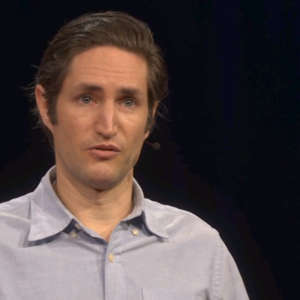Why our screens make us less happy
Adam Alter | TED2017 • April 2017
So, a few years ago I heard an interesting rumor. Apparently, the head of a large pet food company would go into the annual shareholder's meeting with can of dog food. And he would eat the can of dog food. And this was his way of convincing them that if it was good enough for him, it was good enough for their pets. This strategy is now known as "dogfooding," and it's a common strategy in the business world. It doesn't mean everyone goes in and eats dog food, but businesspeople will use their own products to demonstrate that they feel -- that they're confident in them. Now, this is a widespread practice, but I think what's really interesting is when you find exceptions to this rule, when you find cases of businesses or people in businesses who don't use their own products. Turns out there's one industry where this happens in a common way, in a pretty regular way, and that is the screen-based tech industry.
So, in 2010, Steve Jobs, when he was releasing the iPad, described the iPad as a device that was "extraordinary." "The best browsing experience you've ever had; way better than a laptop, way better than a smartphone. It's an incredible experience." A couple of months later, he was approached by a journalist from the New York Times, and they had a long phone call. At the end of the call, the journalist threw in a question that seemed like a sort of softball. He said to him, "Your kids must love the iPad." There's an obvious answer to this, but what Jobs said really staggered the journalist. He was very surprised, because he said, "They haven't used it. We limit how much technology our kids use at home."
This is a very common thing in the tech world. In fact, there's a school quite near Silicon Valley called the Waldorf School of the Peninsula, and they don't introduce screens until the eighth grade. What's really interesting about the school is that 75 percent of the kids who go there have parents who are high-level Silicon Valley tech execs. So when I heard about this, I thought it was interesting and surprising, and it pushed me to consider what screens were doing to me and to my family and the people I loved, and to people at large.
So for the last five years, as a professor of business and psychology, I've been studying the effect of screens on our lives. And I want to start by just focusing on how much time they take from us, and then we can talk about what that time looks like. What I'm showing you here is the average 24-hour workday at three different points in history: 2007 -- 10 years ago -- 2015 and then data that I collected, actually, only last week. And a lot of things haven't changed all that much. We sleep roughly seven-and-a-half to eight hours a day; some people say that's declined slightly, but it hasn't changed much. We work eight-and-a-half to nine hours a day. We engage in survival activities -- these are things like eating and bathing and looking after kids -- about three hours a day.
That leaves this white space. That's our personal time. That space is incredibly important to us. That's the space where we do things that make us individuals. That's where hobbies happen, where we have close relationships, where we really think about our lives, where we get creative, where we zoom back and try to work out whether our lives have been meaningful. We get some of that from work as well, but when people look back on their lives and wonder what their lives have been like at the end of their lives, you look at the last things they say -- they are talking about those moments that happen in that white personal space. So it's sacred; it's important to us.
Now, what I'm going to do is show you how much of that space is taken up by screens across time. In 2007, this much. That was the year that Apple introduced the first iPhone. Eight years later, this much. Now, this much. That's how much time we spend of that free time in front of our screens. This yellow area, this thin sliver, is where the magic happens. That's where your humanity lives. And right now, it's in a very small box.
So what do we do about this? Well, the first question is: What does that red space look like? Now, of course, screens are miraculous in a lot of ways. I live in New York, a lot of my family lives in Australia, and I have a one-year-old son. The way I've been able to introduce them to him is with screens. I couldn't have done that 15 or 20 years ago in quite the same way. So there's a lot of good that comes from them.
🌟 字数限制,完整文本翻译,以及视频见公众号【琐简】,回复"1"可进【打卡交流群】


TED|为什么屏幕使我们更不开心?
9分钟 · 38·
38· 0
0
 38
38 0
0
